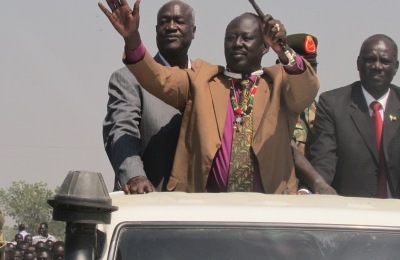Jonglei’s new governor says security, roads and unity are priorities
January 3, 2016 (BOR) – The newly appointed governor of of new Jonglei state, Philip Aguer Panyang, said his priorities as governor will be security, peace and roads construction in the state.

“We will establish strong defense around our communities so that if someone attack(s) us, he will know that we are strong and will not come back again. We will talk with Murle and Nuer to have peace,’ said Aguer when he was addressing the gathering in Bor.
According to Aguer, the presence of the SPLA national army and other organized forces in the state would be used by his office to defend the communities.
Roads and clinics, would be planned and developed with contributions from all the citizens, he said.
“I need you to work with me with one heart. I am not going to distribute anything to you, but instead I will collect from you revenues, and this revenue will be administered and used under our supervisions. If we contribute, we can develop our state, we can make roads, we can [build] schools and health centers and we can pay those who will protect us,” he said.
Bor, the state capital of Jonglei state, had been defended by foreign forces from the neighboring Uganda for the past two years since early 2014 after opposition forces allied to former vice-president, Riek Machar, in January 2014 defeated the national army (SPLA) and captured the state capital two weeks after war erupted on 15 December 2013.
He also said he will work towards developments that would indicate that the South Sudanese army (SPLA) originated in Bor or Jonglei state, criticizing that there had been nothing which showed the ruling party (SPLM) and its military wing (SPLA) originated in the greater Bor area.
“But we have nothing to show that the SPLA/M began here. We must make something, which will show anybody that SPLA/M started here. All of us will make this happen, not me alone,” said Aguer.
Aguer also pledged to work with United Nations agencies to make sure that the people of greater Bor community who fled across the river Nile into neighboring Lakes state in Bahr el Ghazal region due to the current war and settled in Mingkaman camp are encouraged to return to their homes.
South Sudan minister of information, Michael Makuei Lueth, who is also the chairman of the greater Bor community, while delivering his speech at the occasion, urged the people of Bor to rally behind Philip Aguer, and support him in his work.
“We brought Aguer Panyang as the governor of new Jonglei state. We selected him as people of greater Bor and the president appointed him. We want you to work with him because nobody can work in isolation,’ said Lueth.
“We are behind in all aspects. Bor still have structures built during the time of colonial powers. As People of Bor, we are like a carpenter who produces good quality products for sale, and doesn’t take for himself any furniture for his own use. Such a carpenter doesn’t have a chair to sit on, or his dining table either. Let us not be like that carpenter,” he warned.
Time is now, according to Lueth, for Jonglei state to be developed by pooling revenues from people, but added this can happen only if there is unity among the people.
“Let us leave behind our differences among us, let us leave them here, and those who had been dividing us should be stopped and let us unite and work for the common benefit of all,” he advised.
NO POWER SHARING WITH SPLM-IO
Minister of defence, Kuol Manyang Juuk, who also accompanied Aguer, ruled out any share of power to be given to the SPLM-IO faction led by Riek Machar in Jonglei state government, saying the new Jonglei had no opposition members and would not abide by the peace agreement.
“Before the division of Jonglei state, it was said that Jonglei state deputy governor would be from SPLM-IO, but today, as you are seated here, who is from SPLM-IO? You have nobody in SPLM-IO, nobody. Let IGAD come and say put this person, was part of SPLM-IO,’ he commented.
“If someone comes, I will ask him, which wing he was before peace came. You cannot get in Juba here [and] say, I am SPLM-IO, if so, and then all of us will be rebels,” he warned.
The peace agreement gives SPLM-IO 40% of power sharing of the whole Jonglei state and would also take 40% from the three new states of Jonglei, Eastern Bieh and Western Bieh, if the new 28 states were to be endorsed. There was an understanding that the deputy governor would come from the opposition as will the government take deputy governors in states of Unity and Upper Nile.
But Juuk said the former vice-president had now accepted to return to the position he did not like before the war, hence things would return to the status quo.
“The person [Riek] who wanted to take leadership by force, was wrong. That option of force did not succeed and Riek has now come back behind Kiir. The seat he refused before, he will accept it,” he said.
Observers say such negative comments from high profile leaders of the government indicated that true peace and reconciliation among the people in the war-ravaged nation was still far from reach.
(ST)
